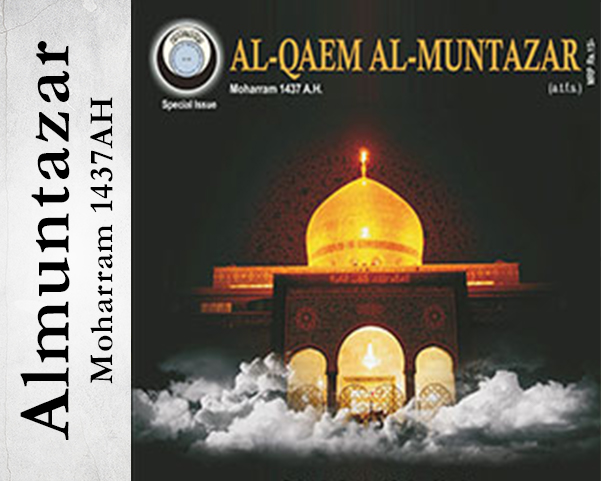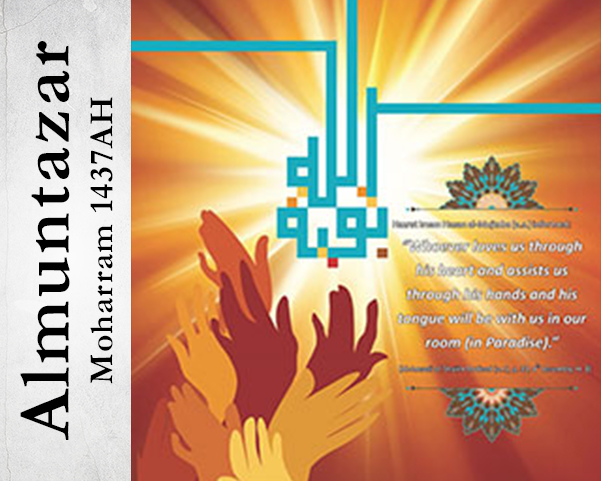Peace be upon you. May Allah hasten the covenant He has made with you concerning (His) help and the establishment of the affairs!
(Ziarat of Imam Zamana (a.s.) on Friday)
Even though the word “ajjil” over here is used in the past tense, yet its meaning is similar to the word “swalle” which has been used in the preceding sentence in the form of a supplication.
The word “ajjil” is derived from the root “A-j-l”, which means ‘to hasten,’ or ‘to hurry.’ Further, “ajjil” is the first seegah of the past tense in ‘Bab-e-Taf’eel’. Raaghib Isfahani mentions in his book Al-Mufradaat that its meaning is ‘to intend or seek resolutely for a thing before its fixed time.’
In this sentence the reader of this ziyarat implores, O Allah, Hasten his (a.s.) reappearance and (Your) help.
Before we proceed, let’s briefly elaborate on the words “ajjil” and “ta’jeel”
A) The significance of praying for the early reappearance of Imam-e-Zamana (a.t.f.s.):
The happiness and satisfaction of Imam-e-Zamana (a.s.) is the greatest desire of an individual who is awaiting his (a.s.) reappearance and the most painful thoughts for a believer are concerning the difficulties and troubles endured by Imam-e-Zamana (a.s.) during occultation.
Thus, the most important responsibility for a believer is to perform — to the best of his abilities — deeds which stave-off the troubles, worries and problems surrounding his Imam (a.s.) and he is not lax in fulfilling his duty in this regard.
With this backdrop, it’s imperative to understand that the best thing that will please Hazrat Vali-e-Asr (a.t.f.s.) is to receive Allah’s permission for appearance. In it lies not only his (a.t.f.s.) happiness but also that of the Messengers (a.s.), Imams (a.s.) and other believing men and women.
The most effective way of achieving this objective is through supplications. Praying for the early reappearance of Imam (a.t.f.s.) in this era of occultation is a result of one’s intense love and recognition. Without regularly praying for his reappearance, the claims of mastership, love and recognition ring hollow.
Imam-e-Asr (a.t.f.s.) himself has taught his friends this beautiful practice. No sooner was he (a.s.) born, he went into prostration — raised his index finger skywards and after bearing witness to all things, he prayed:
“..O Allah! Fulfil the covenant that You made with me.”
(Behaarul Anwaar, vol. 51, p. 13)
Imam Hasan al-Askari (a.s.) says:
“O Ahmad Ibn Is’haaq! I swear by Allah, he will go in occultation. None will remain safe in this era (of occultation) except the one whom Allah has kept firmly rooted in the belief of his (a.s.) Imamat and has granted him the grace to pray for his early reappearance.”
(Kamaaluddin, chapter 38, vol. 1)
B) No contradiction between hastening (Ta’jeel) and submission (Tasleem)
Ta’jeel means to pray for an early reappearance. Here, a question may crop up in the mind, ‘Isn’t praying for an early reappearance opposing Divine predestination (qaza wa qadar) concerning this matter?’
The reply is, ‘To pray for an early reappearance is in fact a direct consequence of the faith in Allah’s supremacy and infinite authority. He himself has commanded us to beseech Him. Then, to implore Allah is every servant’s duty while to mould the destiny is Allah’s prerogative. It is the servant’s duty to submit and accept the decree of Allah. There isn’t any kind of conflict here.
The point will become clear with the help of an example. Suppose a person is affected with an illness. His near and dear ones pray fervently for his recovery, but he passes away. Now, the family members surrender to the divine decree. Is there any contradiction in this? Certainly not! In fact not praying to Allah for the recovery of an ailing person is not to be construed as a sign of submission (to Allah’s Will). On the contrary it’s a sign of being haughty and needless of Allah.
C) The difference between hastening () and seeking haste ()
As it has been discussed before — praying for the ‘hastening’ () of the reappearance of Imam (a.s.) has been appreciated in traditions. For instance Imam (a.s.) says:
“And pray excessively for the hastening of my reappearance. For in it lies your deliverance.”
(Mikyaal al-Makaarim, vol. 2)
The reason for this is that a person should never feel hopeless and miserable waiting for the reappearance of Imam (a.s.). His eyes should await the coming of his Master (a.s.) every morning and evening. He should keep praying for his (a.s.) early reappearance. To consider the reappearance of Imam-e-Zamana (a.s.) as imminent is a sign of complete faith in Allah’s promise.
What is meant by ‘seeking haste’ (Ist’jaal)?
In certain cases, the infallible Imam(a.s.) have condemned hastiness and those in a hurry. For instance Imam Sadiq (a.s.) says:
“The Mahaadheeroon shall be annihilated.”
The narrator asked Imam (a.s.), “Who are the ?”
Imam (a.s.) replied: “Those who make haste (al – Musta’jeloon)”
Then Imam (a.s.) further added:
“And the ones who reckon the reappearance to be near will get salvation.”
(Al Ghaybah of al-Numani (r.a.), Chapter 11, H. 5)
Come let us analyse this splendid tradition. “” is the plural of “” and in Arabic it refers to a horse that gallops swiftly. Here, however, it means those who make haste. The infinitive of َ“” (those who make haste) is “Ist’jaal” (seeking haste) which in actuality implies ‘to show dissent with the command and will of Allah with regards to the reappearance of Imam (a.s.).’ But to consider the reappearance of Imam-e-Zamana (a.s.) as near is in itself a sign of submission. Not only is Allah happy with such an act (of awaiting the reappearance of Imam (a.s.)) but also the infallible Imams (a.s.) have approved of it.
What’s more, if the reappearance of Imam (a.s.) is perceived to be far-off – even if it is for a fleeting moment – then this act is enumerated as a great sin because it is a sign of being despondent of Allah’s mercy.
That said, there’s one very important issue which needs to be addressed here. To reckon the time of reappearance to be near doesn’t mean that we fix a time for his (a.s.) reappearance. Those who do such a thing have been termed as liars in the traditions of Imam (a.s.).
Therefore, those who speak about the signs and in doing so tell the people that the reappearance will happen today, tomorrow or coming Friday have themselves gone astray. They are also deviating and corrupting others because fixing a time for reappearance will cause false hope and despair.
D) Commendable hastiness and forbidden hastiness
Before we wrap up the discussion, we think it is essential to reply to Raaghib Isfahani’s view under the word “ajjil”. Raaghib says, “Since this word is used an expression for ‘self desire’, thus in all places in the Quran – wherever it has been used – this act has been condemned. To the extent that it has become a proverb ‘Hastiness is from the works of Shaitan’. To support his view, he even brings forth a couple of verses from the Holy Quran. However, Raaghib has missed the fact that “ajjil” has one more synonym in the Holy Quran which has been praised.
For example, Allah says:
And run speedily towards the forgiveness of your Lord.
(Surah Aale Imran: Verse 133)
Or Allah says:
And they run fast towards charity.
(Surah Anbiya: Verse 90)
In this verse Hazrat Zakariyyah (a.s.), his wife and his son Hazrat Yahya (a.s.) are being lauded for rushing towards good deeds.
Hence, if rushing, hastiness and hurrying are for the sake of good actions then there is no evil in it. The Holy Quran itself has commanded the believers to rush towards goodness
“And hurry towards good actions.”
(Surah Baqarah: Verse 148)
E) Pray for the sake of reappearance or for the love of worldly power?
Before concluding, it is worth reiterating that the essence of waiting for the reappearance of Imam (a.s.) isn’t about a person hoping to gain worldly power or authority. Instead, the aim is to see the Ahlul Bait (a.s.) and their followers attain happiness and bliss irrespective of us personally getting some status or position.
Abu Baseer asked Imam Sadiq (a.s.):
‘May I be sacrificed for you, when will there be comfort?
Imam (a.s.) replied:
“O Abu Baseer, are you from those who crave for this world? Whoever acquires knowledge of this affair (Imamat and wilayat); his awaiting itself will become the cause of his deliverance.”
(Al Ghayba of an-Numani (r.a.), chapter 25, H. 3)
The other important word in this sentence of the ziyarat is “” i.e. promise. The reappearance of Imam-e-Asr (a.s.) is a divine promise and Allah never breaks His promise. The time of reappearance can defer but reappearance itself can not be annulled because it is a Divine promise.
Abu Hashim Ja’fari asked Imam Mohammad Taqi al-Jawad (a.s.):
“Can the rise of Qaem be deferred?”
Imam (a.s.) replied:
“Verily (the rising of) Qaem is a promise of Allah and He never goes against His promise.”
(Al Ghayba of an-Numani (r.a.), chapter 18, H. 10)
What has Allah promised Imam-e-Asr (a.s.)? This is a question which rises in light of the above sentences. Here the two things which come are discussed — divine help and establishing of the affairs. Since we have already discussed about the reign of Aale Muhammad (a.s.) in our earlier issues, hence, we’ll restrict our discussions on the matter of divine help.
Divine Help
This topic is so vast that even an entire book may not do justice to it. But considering the limitations and conciseness of this article, we’ll restrict ourselves to a few verses from the Holy Quran to augment our discussion.
1) Successful is he who has Allah’s help
“And We helped them, so they overcame.”
(Surah al-Saaffat: Verse 116)
2) Allah helps whomsoever He wishes
“Allah strengthens with His help whom He pleases.”
(Surah Aale Imran: Verse 13)
(There are a thousand meanings hidden in a small part of this magnificent verse. The meek shouldn’t feel disappointed awaiting divine help and the powerful shouldn’t be proud and arrogant of their wealth and power)
3. The Almighty Allah’s help is encompassing
“And that Allah may help you with a complete help.”
(Surah Fath: Verse 3)
4) When Allah helps then none can overpower us
“If Allah helps you, none can overwhelm you: If He forsakes you, who is there, after that, who can help you? In Allah, then, let the believers put their trust.”
(Surah Aale Imran: Verse 160)
5) True help is only from Allah
“…there is no help except from Allah. The Exalted, the Wise.”
(Surah Aale Imran: Verse 126)
6) It is the custom of the Prophets (a.s.) to seek Allah’s help
“He (H.Nuh) said: O My Lord, help me as they deny me.”
(Surah Mominoon: Verse 26)
“He (H. Lut) prayed: O My Lord! Help me against the mischievous nation.”
(Surah Ankabut: Verse 30)
“Or do you think that you shall enter the Garden (of bliss) without such (trials) as came to those who passed away before you? They encountered suffering and adversity, and were so shaken in spirit that even the Messenger and those of faith who were with him cried: “When (will come)the help of Allah?” Ah! Verily, the help of Allah is (always) near!”
(Surah Baqarah: Verse 214)
7) Ways of attaining Divine Help
Different verses of Holy Quran have mentioned the reasons through which the human race is deserving of Allah’s help. Keeping brevity in mind, we enlist a few.
a) Faith:
Allah the Almighty has promised in the Holy Quran that He will help the believers. In fact He has considered this as His duty. He says:
“…to help the believers is ever incumbent upon us.”
(Surah Rome: Verse 47)
b) Help Allah and He will you
“O those who believe! If you help (the cause of) Allah, He will help you and make your feet steadfast.”
(Surah Muhammad: Verse 7)
In this verse an additional condition, besides faith mentioned in order to receive divine assistance — and that is to support Allah. The question here: Is the One who is Needless of anything in the universe dependent on our help? Is Allah the Almighty in need of our help and support? Not really. Here the meaning of helping Allah means helping Allah’s divine proof — i.e. to help Imam-e-Asr (a.s.); to help the religion of Allah.
Those who helped Imam Husain (a.s.) and sacrificed their life for him in Kerbala, in fact have helped the religion of Allah. It is for this reason that in ziyaarat we remember them with these words
“Peace be upon you all O the helpers of the religion of Allah!. Peace be upon you all, O the helpers of Messenger of Allah.!”
It should be borne in mind that just as Allah is independent of anyone’s help, likewise Holy Prophet (s.a.w.a.) and the Infallible Imams (a.s.), too, are not dependent on anyone. For, these are the individuals upon whom Allah has conferred “mastership in the world of creation” (Wilayat-e-Takweeni). It means they have unlimited authority over the universe. Yet Allah has made it incumbent upon man to help and support them in order to test humankind. Whoever helps them has indeed helped Allah and His religion. What’s more, to help them is the best form of worship. We find in Holy Quran:
“Nay! If you remain patient and are on your guard, and they come upon you in a headlong manner, your Lord will assist you with five thousand of the havoc-making angels.”
(Surah Aale Imran: Verse 125)
If a believer bears these qualities then Allah, according to His promise, will surely help him even though the great remnant of Allah, Imam-e-Zamana (a.s.) possess these qualities exist in him to the peak of perfection. Allah will certainly assist him (a.s.) and also those who shall support him
(To be continued…. Inshallah)














